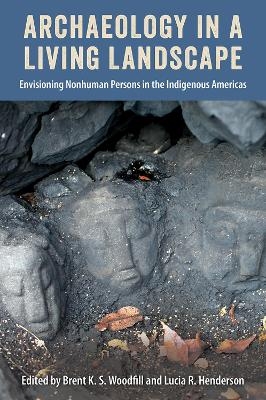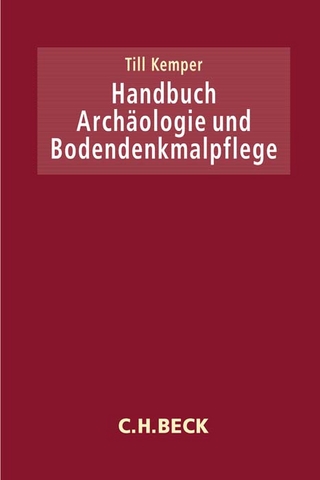
Archaeology in a Living Landscape
Envisioning Nonhuman Persons in the Indigenous Americas
Seiten
2024
University Press of Florida (Verlag)
978-0-8130-7919-6 (ISBN)
University Press of Florida (Verlag)
978-0-8130-7919-6 (ISBN)
- Lieferbar (Termin unbekannt)
- Versandkostenfrei innerhalb Deutschlands
- Auch auf Rechnung
- Verfügbarkeit in der Filiale vor Ort prüfen
- Artikel merken
Explores the diverse range of other-than-human persons that inhabited and affected the landscape of the ancient Americas. These case studies acknowledge that Indigenous communities have long recognized degrees of personhood in landscapes, plants, and animals and that this worldview should be taken seriously.
Recognizing and incorporating Indigenous knowledge systems in archaeological studies of the Americas This book explores the diverse range of other-than-human persons that inhabited and affected the landscape of the ancient Americas. These case studies acknowledge what is often dismissed by Western scholars: that Indigenous communities have long recognized degrees of personhood in mountains, volcanoes, caves, springs, rivers, rocks, plants, archaeological sites, trees, and animals and that this worldview should be taken seriously in archaeological investigations, community relations, and interpretations.
In Archaeology in a Living Landscape, contributors examine the role of nonhuman agents in the ancient world, from land management and tenure to economics, politics, migration, pilgrimage, trade routes, conquest, ethics, and philosophy. Chapters describe Tlingit cosmology, lightning beings and magnetism in the Minnesota River Region, linguistic approaches to animacy in the United States Southeast, nonhuman persons in the ancient Maya economy, and Lacandon Maya ritual landscapes. They investigate the role of quarries in the building of Inka huacas (sacred spaces or objects), clay procurement and Andean apus (powerful mountains), Amazonian animism in polychrome ceramics, and the built and unbuilt landscape of the Mapuche. An epilogue by Dakota elder James Wa?bdí Ha?yetu Rock highlights how Western academic discourse often diverges from the viewpoints of Indigenous subjects.
The contributors to this volume use language accessible to readers of diverse backgrounds. They focus on the centrality of nonhuman persons in the lives of Indigenous communities, working to move away from Western biases to embrace and integrate Indigenous belief frameworks in their studies. Archaeology in a Living Landscape highlights the value of Indigenous knowledge systems not just as archaeological evidence but as a body of theory.
Contributors: Steve J. Langdon | Lisa J. Lucero | Alexei Vranich | James Rock | Eleanor Harrison-Buck | Lucia R. Henderson | Nicola Sharratt | Patrick Ryan Williams | Bill Sillar | Brent K.S. Woodfill | Jacob J. Sauer | Margaret Spivey-Faulkner | Sigrid Arnott | Dianne Desrosiers | Joshua Feinberg | David Maki | Carolyn Dean | Alice Balsanelli | Joel W. Palka | A.C. Roosevelt | Dennis Ogburn
Recognizing and incorporating Indigenous knowledge systems in archaeological studies of the Americas This book explores the diverse range of other-than-human persons that inhabited and affected the landscape of the ancient Americas. These case studies acknowledge what is often dismissed by Western scholars: that Indigenous communities have long recognized degrees of personhood in mountains, volcanoes, caves, springs, rivers, rocks, plants, archaeological sites, trees, and animals and that this worldview should be taken seriously in archaeological investigations, community relations, and interpretations.
In Archaeology in a Living Landscape, contributors examine the role of nonhuman agents in the ancient world, from land management and tenure to economics, politics, migration, pilgrimage, trade routes, conquest, ethics, and philosophy. Chapters describe Tlingit cosmology, lightning beings and magnetism in the Minnesota River Region, linguistic approaches to animacy in the United States Southeast, nonhuman persons in the ancient Maya economy, and Lacandon Maya ritual landscapes. They investigate the role of quarries in the building of Inka huacas (sacred spaces or objects), clay procurement and Andean apus (powerful mountains), Amazonian animism in polychrome ceramics, and the built and unbuilt landscape of the Mapuche. An epilogue by Dakota elder James Wa?bdí Ha?yetu Rock highlights how Western academic discourse often diverges from the viewpoints of Indigenous subjects.
The contributors to this volume use language accessible to readers of diverse backgrounds. They focus on the centrality of nonhuman persons in the lives of Indigenous communities, working to move away from Western biases to embrace and integrate Indigenous belief frameworks in their studies. Archaeology in a Living Landscape highlights the value of Indigenous knowledge systems not just as archaeological evidence but as a body of theory.
Contributors: Steve J. Langdon | Lisa J. Lucero | Alexei Vranich | James Rock | Eleanor Harrison-Buck | Lucia R. Henderson | Nicola Sharratt | Patrick Ryan Williams | Bill Sillar | Brent K.S. Woodfill | Jacob J. Sauer | Margaret Spivey-Faulkner | Sigrid Arnott | Dianne Desrosiers | Joshua Feinberg | David Maki | Carolyn Dean | Alice Balsanelli | Joel W. Palka | A.C. Roosevelt | Dennis Ogburn
Brent K. S. Woodfill, professor of anthropology at Winthrop University, is the author of War in the Land of True Peace: The Fight for Maya Sacred Places. Lucia R. Henderson is an independent scholar located in Washington, D.C.
| Erscheinungsdatum | 03.10.2024 |
|---|---|
| Zusatzinfo | 77 b&w illus., 3 tables |
| Verlagsort | Florida |
| Sprache | englisch |
| Maße | 155 x 235 mm |
| Themenwelt | Geisteswissenschaften ► Archäologie |
| Sozialwissenschaften ► Ethnologie | |
| Sozialwissenschaften ► Soziologie | |
| ISBN-10 | 0-8130-7919-5 / 0813079195 |
| ISBN-13 | 978-0-8130-7919-6 / 9780813079196 |
| Zustand | Neuware |
| Informationen gemäß Produktsicherheitsverordnung (GPSR) | |
| Haben Sie eine Frage zum Produkt? |
Mehr entdecken
aus dem Bereich
aus dem Bereich
maternal health science and the reproduction of harm
Buch | Softcover (2024)
University of California Press (Verlag)
37,40 €
Holocaust heritage, noncitizen futures, and black power in Berlin
Buch | Softcover (2022)
University of California Press (Verlag)
37,40 €


